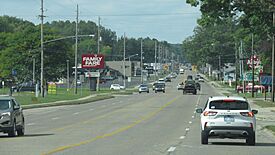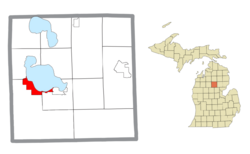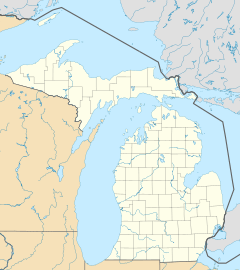Houghton Lake, Michigan facts for kids
Quick facts for kids
Houghton Lake, Michigan
|
|
|---|---|

Looking west along M-55
|
|

Location within Roscommon County
|
|
| Country | United States |
| State | Michigan |
| County | Roscommon |
| Townships | Denton, Lake, and Roscommon |
| Settled | 1873 |
| Area | |
| • Total | 12.38 sq mi (32.07 km2) |
| • Land | 10.75 sq mi (27.84 km2) |
| • Water | 1.63 sq mi (4.22 km2) |
| Elevation | 1,145 ft (349 m) |
| Population
(2020)
|
|
| • Total | 5,294 |
| • Density | 492.47/sq mi (190.14/km2) |
| Time zone | UTC−5 (Eastern (EST)) |
| • Summer (DST) | UTC−4 (EDT) |
| ZIP code(s) | |
| Area code(s) | 989 |
| FIPS code | 26-39400 |
| GNIS feature ID | 0628665 |
Houghton Lake is a community in Roscommon County, Michigan. It's a place where people live, but it's not officially a city or town. In 2020, about 5,294 people lived here. This makes it the biggest community of its kind in Northern Michigan. The community is spread across three different areas called townships.
Houghton Lake is named after Houghton Lake, which is the largest lake inside Michigan. The community also includes a smaller area called Houghton Lake Heights. Another community, Prudenville, is right next to Houghton Lake. The main road that goes through the area is M-55.
Contents
History of Houghton Lake
The land around Houghton Lake has been home to people for thousands of years. It was originally the land of the Odawa and Ojibwe Native American tribes. In 1836, these tribes gave up a large amount of their land, including the Houghton Lake area, to the United States.
Michigan became a state the next year. In 1838, a surveyor named John Brink first recorded the lake, calling it Red Lake. Later, in 1852, the lake was renamed Houghton Lake. This was done to honor Douglass Houghton, who was Michigan's first state geologist.
The first European settlers arrived in 1869. By 1873, the settlement of Houghton Lake was officially started. For a short time, from 1874 to 1878, Houghton Lake was the main town for Roscommon County.
Lumbering and Tourism in Houghton Lake
In the mid-1800s, the area was very important for the lumber industry. Many lumber camps were set up, and roads and railways were built to help move the wood. Logs were floated from Houghton Lake down the Muskegon River to sawmills. This industry brought many settlers to the area.
After the lumber industry slowed down in the early 1900s, the railways that used to carry logs started carrying people instead. Visitors came to fish, hunt, and enjoy the beautiful "north country." Houghton Lake became famous for its fishing.
By the mid-1900s, Houghton Lake was known as a popular vacation spot. Today, many vacation homes and businesses are located around the lake. It continues to be a favorite place for thousands of visitors each year.
The "Johnson Dance Hall," built in 1927, was a big entertainment spot for many years. Now, it's home to The Houghton Lake Historical Society. They host an event called "Historic Village Days" there every year.
Geography and Climate
Houghton Lake covers about 12.38 square miles. Most of this area is land, but about 1.63 square miles is water.
Houghton Lake's Weather
Houghton Lake has a climate with warm summers and cold, snowy winters. The area gets a good amount of rain throughout the year, and a lot of snow in winter.
People of Houghton Lake
| Historical population | |||
|---|---|---|---|
| Census | Pop. | %± | |
| 1990 | 3,353 | — | |
| 2000 | 3,749 | 11.8% | |
| 2010 | 3,427 | −8.6% | |
| 2020 | 5,294 | 54.5% | |
| U.S. Decennial Census | |||
In 2020, there were 5,294 people living in Houghton Lake. Most people in the community are White. A small number of people are from two or more races, and a small percentage are Hispanic or Latino.
In 2010, about a quarter of households had children under 18. Many households were married couples living together. The average age of people in Houghton Lake was 44 years old.
Getting Around Houghton Lake
Bus Services
- Indian Trails offers daily bus service to places like St. Ignace and East Lansing, Michigan.
- Greyhound Lines also provides daily bus service from Houghton Lake to its wider network.
Main Roads
 US 127 runs north and south, just west of Houghton Lake. This highway connects to other major cities in Michigan.
US 127 runs north and south, just west of Houghton Lake. This highway connects to other major cities in Michigan. M-55 goes east and west right through Houghton Lake. This road starts near Lake Michigan and goes all the way to Lake Huron.
M-55 goes east and west right through Houghton Lake. This road starts near Lake Michigan and goes all the way to Lake Huron.
Airport
Local Public Transit
- The Roscommon County Transportation Authority offers bus service throughout Roscommon County. It's a door-to-door service, and students and senior citizens can ride for a lower fee.
Fun Things to Do in Houghton Lake
Houghton Lake is a great place for outdoor activities and has many attractions.
- There are beaches like Heights Park Beach and Sullivan Beach where you can relax by the water.
- The area has many resorts and places to stay for visitors.
- You can go birdwatching on the Ausable Birding Trail, where you might see special birds like Kirtland's warblers and bald eagles.
- Houghton Lake is also popular for kayaking, riding on ORV (Off-Road Vehicle) trails, and fishing.
Tip Up Town USA Winter Festival
Houghton Lake hosts "Tip Up Town USA," which is Michigan's oldest and biggest winter festival. It happens throughout January. The festival includes:
- An opening ceremony
- The Polar Bear Plunge (where people jump into cold water!)
- Fundraising events
- Contests for special titles
The festival ends on the fourth weekend of January with a parade and a winter carnival. You can enjoy ice fishing, carnival rides, and snowmobile races.
Fishing in Houghton Lake
Houghton Lake is Michigan's largest inland lake, covering about 22,000 acres. It's often called a "Fish Factory" because it's a great place for fish to live. The lake is not very deep, only about 24 feet at its deepest, and has many plants underwater where fish like to hide. There are seven public places where you can access the lake. Many shops and businesses around the lake support fishing, selling bait, tackle, and boats.
Golf Courses
Houghton Lake has three golf courses:
- Pine View Highlands: This course has won awards, including "One Of The Gems Of The North" and "#1 People’s Choice Award."
- The Quest Golf Club: This is a championship course designed by a professional golfer named Ken Green.
- White Deer Country Club
Historic Village Museum
The Houghton Lake Historic Village Museum is like a trip back in time. It has 14 historical buildings that have been fixed up or rebuilt to look like they did during the logging era in the late 1800s. You can see old tools and items from that time in a log schoolhouse built around 1876. The museum also has a chapel, a town hall, old businesses, and two homes.
Images for kids
See also
 In Spanish: Houghton Lake (Míchigan) para niños
In Spanish: Houghton Lake (Míchigan) para niños
 | Laphonza Butler |
 | Daisy Bates |
 | Elizabeth Piper Ensley |




